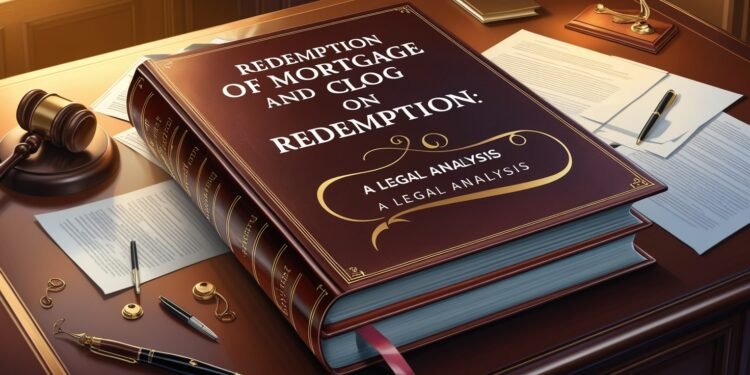Prabhjot Kaur
BA LLB, LLM, Chandigarh University
Introduction
A key component of property law, mortgages provide borrowers with access to funds while offering lenders security. At the core of mortgage transactions is the right of redemption, which refers to a borrower’s ability to recover their assets once the mortgage loan is paid off.
Background
The concepts of redeemable rights and the “clog on redemption” doctrine are essential in property law, especially regarding the relative power of mortgagors and mortgagees. It is crucial for property owners and solicitors alike to comprehend these ideas. The article examines the notion of clog on redemption and the legal principles related to the right of redemption, analyzing how courts have applied and interpreted these principles in mortgage transactions.
1. Overview of the Legal Issue
A mortgagor who fully repays the obligation may redeem their mortgaged property under the right of redemption. Any clause in the mortgage agreement that unjustly limits or prohibits this power is referred to as a “clog on redemption.” This subject is significant in legal discourse due to its connection with the equity of redemption, a cornerstone of mortgage law. Given that a mortgage should not serve as an instrument of oppression, judges scrutinize any conditions that might limit redemption rights.
2. Analysis of Relevant Case Law or Legislation
The case of Jones v. Morgan (1882) is a seminal case for understanding the application of the clog on redemption doctrine. The court ruled that any clause prohibiting the mortgagor from exercising their redemption rights is null and void. Similarly, the Indian case of Ganga Dhar v. Shankar Lal (1958) recognized the nullity of any clause that conflicts with the right of redemption.
The right of redemption is an equitable right that cannot be unfairly relinquished or curtailed, despite mortgage agreements being contracts. This principle is enshrined in Section 60 of the Transfer of Property Act, 1882, which states, “The mortgagor may, upon payment or tendering of the mortgage-money at a suitable time and location, require the mortgagee to deliver the mortgage-deed and all documents pertaining to the mortgaged property, at any time after the principal money has become due.”
3. Examination of Legal Principles
3.1 Legal Framework
The principle that “once a mortgage, always a mortgage” guarantees that a mortgage will always be a security interest, rather than a means to grant ownership to the mortgagee. This premise supports the mortgagor’s right to redeem the property. The Transfer of Property Act, 1882, explicitly forbids agreements that seek to delay or extinguish the right of redemption (Section 60).
3.2 Comparative Analysis
The issue of restrictions on redemption has been addressed differently by courts across jurisdictions. English courts have strictly upheld the doctrine, while Indian courts have adopted a more moderate stance, allowing certain restrictions as long as they are not oppressive.
4. Practical Implications and Challenges
4.1 Practical Application
It is crucial for property owners to understand their redemption rights to ensure they can reclaim their property upon fulfilling their financial obligations. Lawyers drafting mortgage agreements must take care to exclude any provisions that could be perceived as obstacles to redemption.
4.2 Challenges
One of the main challenges lies in balancing the mortgagor’s equitable right of redemption with the mortgagee’s right to protect their financial interests. Achieving this balance can be difficult, especially in complex financial transactions.
Conclusion
The right of redemption is an essential protection for mortgagors, and any clause restricting this right may be considered a clog on redemption. Courts have consistently upheld this right, emphasizing fairness in mortgage agreements. As property transactions become more complex, the doctrine of clog on redemption will likely continue to evolve, with courts further refining the balance between the rights of the mortgagor and mortgagee.
References
- Smith, J. (2020). The Law of Mortgages. Oxford University Press.
- Kumar, R. (2015). “The interpretation of clog on redemption in Indian courts.” Indian Journal of Law & Justice, 6(2), 115-132.
- Jones v. Morgan (1882).
- Ganga Dhar v. Shankar Lal, AIR 1958 SC 770.
- Transfer of Property Act, 1882, Section 60.



